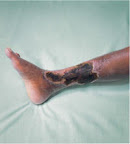Friday, June 23, 2006
Grand Rounds v2.38
Perhaps a little late, but Grand Rounds is up at The Haversian Canal - and The Paper Mask gets a mention too!
Wednesday, June 07, 2006
Can't you take a hint?
 Betty was 95. She lived in a nursing home. She was delirious and bedbound. She had diabetes, emphysema, untreatable ischaemic heart disease, and a recent stroke. And now she had a fever and a gangrenous leg.
Betty was 95. She lived in a nursing home. She was delirious and bedbound. She had diabetes, emphysema, untreatable ischaemic heart disease, and a recent stroke. And now she had a fever and a gangrenous leg.She was going to die, sooner or later.
"She's a fighter" her son said. "Before she became delirious, she told me that she'd rather lose her leg than die."
I didn't say what I was thinking - "This is not a life. You are just torturing her. She is going to die anyway."
Instead I say: "I appreciate what you are saying, but you must understand that amputating her leg has a very high chance of killing her, both immediately and in the near future. And even if she were to survive that operation her quality of life would only be worse, not better. She would definitely never walk again."
"We know that, doc, but we'd rather she die under an anaesthetic than like this. We know that's what she'd want. She doesn't walk as it is."
Perhaps I am weak, but I cannot flat out refuse to do it. I don't know for certain that she will die. She might pull through. Her chances are poor, but they are not zero.
Two days later she is awake and talking to her family. She thanks me for doing the amputation, and goes back to her nursing home. A week later I hear that she has had a "heart attack" and has passed away.
-----
Jerry is 70. He came from a hostel. He was confused but relatively independent , until he developed acute appendicitis. A diagnosis made at laparotomy. He makes a good recovery, but unfortunately, a pressure sore develops on his heel. Bone is exposed, and needs debridement. Malnutrition limits what healing is present. The arterial supply is limited. He is too confused to eat. He needs nasogastric feeding, an angiogram and a small operation to clean his ulcer."We don't think he would appreciate it, doc." said the daughter. "He doesn't know what is going on. He won't want to risk losing his leg. We're sure he wouldn't want a tube in his nose. Why can't we let him die with dignity?"
"He is not going to die anytime soon." I say. "But this ulcer will be with him for the rest of his days unless we remove the bone and put a skin graft on it. The ulcer won't kill him but it will cause him pain."
"We think he's had enough. We'd like to speak to the palliative care nurse."
Palliative care takes him over and he is dosed up to his eyeballs with subcut morphine. A month later he is still alive. I wonder how long he will last at the hospice, and how much morphine he can handle.
-----
 John was 65, living with cerebral palsy, schizophrenia, and a recently fractured humerus. Paraplegic and confused. He had recently been transferred into a nursing home where he was fully dependent. Now he had severe, sudden onset abdominal pain. There was gas under his diaphragm. There was no doubt he had a perforated viscus. Probably a duodenal ulcer. Laparotomy would be straightforward and life-saving. "I'm not going to die, doc. Just give me some pain killers and let me go home. I don't want an operation." he said.
John was 65, living with cerebral palsy, schizophrenia, and a recently fractured humerus. Paraplegic and confused. He had recently been transferred into a nursing home where he was fully dependent. Now he had severe, sudden onset abdominal pain. There was gas under his diaphragm. There was no doubt he had a perforated viscus. Probably a duodenal ulcer. Laparotomy would be straightforward and life-saving. "I'm not going to die, doc. Just give me some pain killers and let me go home. I don't want an operation." he said.There was no family. They had abandoned him years ago. His sister hung up the phone when rung at 2am in the morning. The GP that normally treated John was on holiday. From the little information I could gather, his quality of life was non-existent. Who do I ask? Who do I turn to? Do I have the right to decide whether to operate or palliate? In his incapacitated state does he have the right to refuse surgery?
So I passed the buck, and called the Chief Medical Officer. "What do I do?" I ask. "You are authorised under law to do as you see fit. As the clinician on duty, the hospital will support your decision." came the drab reply over the telephone.
So I wrote up the omeprazole, turned up the morphine infusion, and went back to sleep.
Tuesday, June 06, 2006
Happy Happy Joy Joy
Yesterday I received some very good news. A significant amount of time was spent celebrating, and a significant amount of time this morning was spent recovering. Luckily, the hangover had subsided by the time the emergency redo laparotomy rolled in the door at 1300h. Obviously bad news does not care when good news arrives.
Thursday, June 01, 2006
Time goes quickly when you're having fun
Dr Flea was recently concerned that down-under surgeons have too much time on their hands. I must point out otherwise. Just because clocks run backwards here (I'd say counter-clockwise, but if all clocks ran counter-clockwise, then does that mean than clocks that run clockwise are running backwards and not forwards?) does not mean that they run any slower, or faster, or... you know what I mean.
The only exception is once a day when we are approximately one-Earth's diameter closer to the sun, because the sun's gravitational field is infinitesimally stronger and therefore time does in fact slow down compared to the other side of the world. Though we probably make up for it about 12 hours later. Or sooner. Whatever.
The point is that I have been very, very busy, and will hopefully have more time on my hands soon to work on my Probability of Malpractice Suit Monitor. The problem at the moment is the incessant beeping. I must recalibrate it... it never seems to fall below 5%.
The only exception is once a day when we are approximately one-Earth's diameter closer to the sun, because the sun's gravitational field is infinitesimally stronger and therefore time does in fact slow down compared to the other side of the world. Though we probably make up for it about 12 hours later. Or sooner. Whatever.
The point is that I have been very, very busy, and will hopefully have more time on my hands soon to work on my Probability of Malpractice Suit Monitor. The problem at the moment is the incessant beeping. I must recalibrate it... it never seems to fall below 5%.
Subscribe to:
Comments (Atom)






